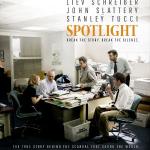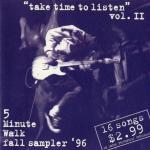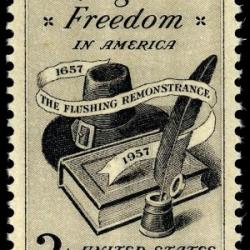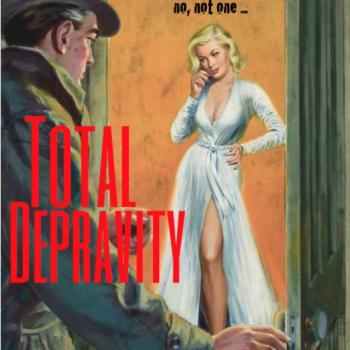I’m not a fan of survey stories as “news.” If the survey is accurate, then all we’re telling readers is “Here’s what you already know.” And if the survey is not accurate, then it’s not worth reporting either. (If the survey claims to be accurate with decimal points — “37.53% of you dislike broccoli” — then I’m 99.99% sure it isn’t.)
Many survey stories come across like Jay Leno’s old “Jaywalking” segments on The Tonight Show — gawking at the rubes who don’t know all the stuff we, their betters, think they ought to know. These tend either to be produced with a condescending sneer or else to be intended to provoke one.
 But these Jaywalking survey stories are useful and they get used. Usually to promote a narrative of decline, a tut-tutting, hell-in-a-handbasket Kids Today lament that flatters the reader and, therefore, can be leveraged for fundraising or recruiting support for almost anything.
But these Jaywalking survey stories are useful and they get used. Usually to promote a narrative of decline, a tut-tutting, hell-in-a-handbasket Kids Today lament that flatters the reader and, therefore, can be leveraged for fundraising or recruiting support for almost anything.
Every six weeks or so, some Christian group commissions a survey like that in the hopes of producing dismaying results that can be held up as evidence of dismal biblical literacy or of theological ignorance. This ignorance is lamented with such glee that it comes across as more of a celebration. Headlines reading “7 out of 10 church-goers cannot name all 10 Commandments” or “40% of Christians think Paul wrote an epistle to the Kardashians.” The point always seems to be to flatter the reader and to promote the work of the organization searching out and carefully measuring this appalling ignorance. Feh.
These surveys are not entirely useless. It matters that “77% of surveyed Americans were able to recall that the First Amendment protects freedom of speech, but less than half were able to name other rights protected by that amendment.” And, yeah, as a Baptist it makes me wonder how many of my fellow Baptists are among those unaware that the Bill of Rights includes the Establishment and Free Exercise clauses.
But other than giving us all another chance to laugh at Amy Coney Barrett — the court-packed Supreme Court justice who was unable to say what the First Amendment includes during her rushed confirmation hearings — what are we supposed to do with this information?
It could be used to build a case for better civics education, from K-12. Isn’t this something every kid should be learning in school? But that specific response to the specific problem highlighted by this survey is less likely than that it just gets repeated as evidence that Schools Are Bad, and thus as support for the defunding of that very same civics education, the censoring and banning of school library books, and the defunding of public education in general.
So I tend to be cautious about those things. And also to apply a kind of automatic discount to the claims of any survey. The more outlandish-seeming or flattering the claim, the bigger the discount.
For example: “4 in 10 Evangelicals Say They’ve Been Visited by the Dead.” Sounds all paranormal and X-Files-ish. But a closer look shows this includes everybody who was, like, “After my mom died I dreamed about her every night for a week and those dreams just seemed so real, you know?”
I do not believe such dreams are visitations, but I do know that they feel like it. And I know that the overwhelming admixture of grief and solace, sorrow and joy in such dreams is something almost impossible to articulate. And I know that this experience of dreaming about the dead is so common that it’s spookier to encounter someone who’s never experienced it.
So, no, I do not believe that Joey Ramone actually came back from the dead to dance with Amy Rigby (probably). But I also don’t see anything paranormal or occult or even unusual about people who have had wildly unsettling dreams following the death of a loved one.
Here’s a rule of thumb: If you have to market the meaning of survey results to make those results seem newsworthy, then they’re probably not.
Granted, survey-story headlines are tricky to write. I think that’s a hint about their general newsworthiness, but it’s also because these stories, to the extent they’re actually stories, tend to be nuanced, and nuance isn’t an easy thing to capture in headlines. “Tornado strikes town, kills 10” is a story that makes it easier to write an accurate headline than “Some share of the populace has slightly modified their answer to this way of phrasing a question.”
One more survey story, from RNS: “Survey: Mainline clergy are more liberal than their congregants.”
That’s not news. Or, at least, that’s not a new finding. This same question has been the focus of countless surveys since at least, roughly, May 17, 1954, all showing what most were seeking and wanting to show, that “Mainline clergy are more liberal than their congregants.”
It’s even older than that, really, since this is tied in with the idea that seminaries are dangerous places churning out dangerous liberals that goes back even beyond the fundamentalist/modernist controversies of the early 20th century. This same notion was the impetus for the creation of “Bible colleges” — places that might train ministers without all of that dangerous book-learning. The whole point of Bible colleges replacing seminaries was to ensure a supply of clergy who would be wholly uninfected by “liberalism” — whether theological or political.
For more than a generation, there’s been a cottage-industry of right-wing organizations weaponizing this notion of out-of-touch “liberal clergy.” IRD — the Institute on Religion and Democracy — is a purported think-tank that’s really just a reactionary rat-fucking operation dedicated to tearing down mainline Protestantism by warning church-goers that their clergy are closet Bolsheviks and that every ecumenical organization (the NCC, the WCC, etc.) is part of a globalist conspiracy of syncretism and socialism.
This latest survey doesn’t seem to be part of that decades-long anti-mainline propaganda campaign, but the choice of headline for its unsurprising findings reflects the influence of that tradition. Consider some other equally accurate options for headlines to this story:
- “Studying scripture in its original languages linked to more liberal political views”
- “Years of theological study reduces intolerance toward ethnic, sexual minorities”
- “Preparing sermons from lectionary leads to more progressive politics”
- “People who’ve been through CPE tend to be more compassionate”
All of those are findings of this study. None of them is any more surprising or remarkable than the headline RNS went with, but I suspect they might have generated a different conversation in response to this survey.













